Lana @ 100: Imitation of Life
 Monday, February 8, 2021 at 5:15PM
Monday, February 8, 2021 at 5:15PM
The Film Experience will visit a few Lana Turner films this week. Here's Nick Taylor...
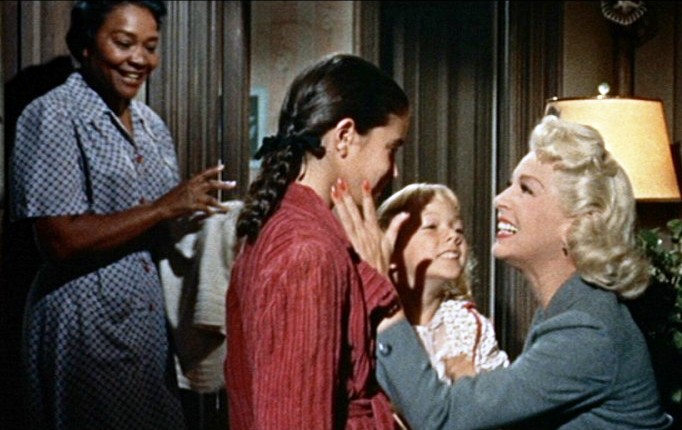
Happy 100th birthday, Lana Turner! Here we are on her centennial to talk about her role as Lora Meredith in Douglas Sirk’s 1959 remake of Imitation of Life, one of her most famous films and easily among the most enduring American melodramas ever made. Imitation’s themes of race and womanhood in America, its sumptuous design, and Oscar-nominated turns from Juanita Moore and Susan Kohner have all rightly received their fair share of attention, yet I have to ask... do most folks like Turner in this?
Maybe my perception that she’s disliked comes from a class in undergrad where my professor didn’t like anything about Turner, from her acting style to the era of beauty she represents. Sirk’s own comments on directing her certainly don’t help...
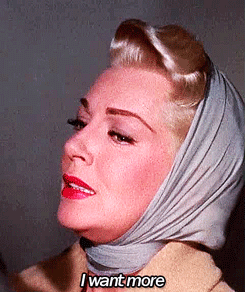
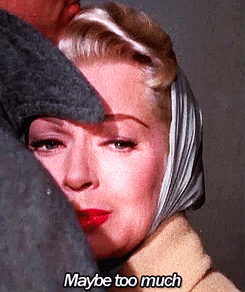
He was vocal after the fact that he undercut her performance in order to draw more attention to the story of Annie and Sarah Jane Johnson. Critical reception has more or less agreed with him since Imitation was released and throughout its many re-evaluations, though of course she’s always had her fans.
At the very least, her praise comes with tangible caveats, and I’m not inclined to totally disagree. You could easily imagine the most accomplished interpretation of this character that Dorothy Malone might’ve provided. But Turner’s own contribution, equal parts savvy casting, star power, and directorial manipulation, creates some of the most unusual tensions in Imitation, in no small part because of her own determined if limited ingenuity.
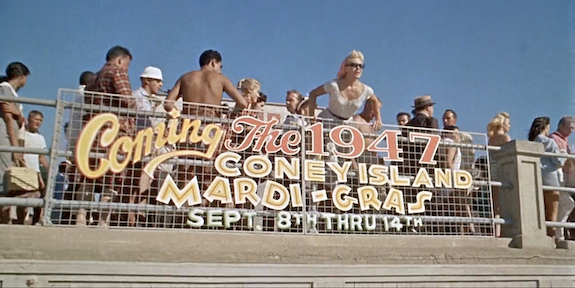
Turner’s Lora Meredith begins the film in a state of distress. She’s lost her daughter Susie at the beach, and her fear is so photogenic that some guy named Steve (John Gavin) takes a picture of her while she’s running around calling for her kid and asking for help. Still, he offers to help, and the two eventually find Susie (Terry Burnham, a dead ringer for The Bad Seed’s Patty McCormick) with another white girl her age named Sarah Jane (Karin Dicker) and a kindly looking black woman named Annie Johnson (Moore, spellbinding). The two women get to talking while their kids play, and Lora is embarrassed to realize that Sarah Jane is Annie’s daughter, and is not a little white girl but an incredibly light-skinned black girl. Lora also learns the Johnsons have nowhere to go, and after initially refusing Annie’s offer to be her maid, she invites them to live with her and Susie. Steve gets her address to deliver the photos he took of her, and off they go back home.
The Meredith family’s apartment is dingy. Yes, their two-bedroom is still nicer than my place and the homes of most people I know, but the white, gray, and earth-tone color scheme with tucked-away hints of pink and gold makes the whole place feel faded and grimy, and it looks barely able to accommodate both sets of mothers and daughters standing in the same room. No Jane Wyman gardens of kaleidoscopic windows of color here. In no time at all they’ve become a family unit, partially due to Annie’s sly ingratiation of herself in Lora’s life, partially because Lora is too grateful for Annie’s work to realize what’s happening.
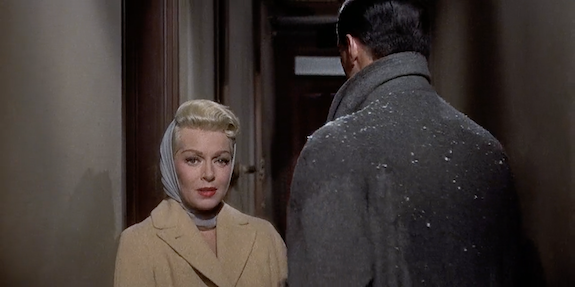
We also learn that Lora’s dream is to become a Broadway actress, and that spends most of her time hunting for auditions and taking whatever side hustle will help pay the bills. She lies about her crummier gigs to her family, mostly to convince them (and herself) that things are going better than they are. And still she perseveres, not giving up hope of fulfilling her life’s dream and taking care of herself and her kid.
The woman Turner sketches in these early scenes is well-meaning if self-absorbed, thoughtful about her own experiences and willing to stand up for herself but frequently able to be surprised by others doing things any audience member can seemingly clock without much prodding. She’s principled, and never more so than when it comes to her own ambitions, even if she’s not above lying to a secretary or bigwig theatre agent about her credentials for a chance to audition for Tennessee Williams. But she will not be made cheap by men in power, and Lora says this with the conviction and shame of someone who’s suffered it before and will never do it again. She says as much to that bigwig agent, emphasizing her conviction and outrage at his offer to help her get onto the swankiest casting couches, and to Steve, unable to hide her shame. This incident nearly kills her ambition, but she holds onto it. In Turner’s hands, Lora’s ambitions, principles, and desperations are not just entwined to each other but entwined to her. There’s no distance between what she wants and what she believes. Where a different actress might fortify this by trying to foreground Lora’s talent, to validate her dream for the audience, Turner makes her certainty so absolute and her need so vividly textured we take her seriously. When she says she’s felt the spark to act all her life, you believe her. Her ability to stand up for herself is admirable, her willingness to trust herself and the olive branches handed to her impressive even as the danger it may all explode in her face looms over that trust.
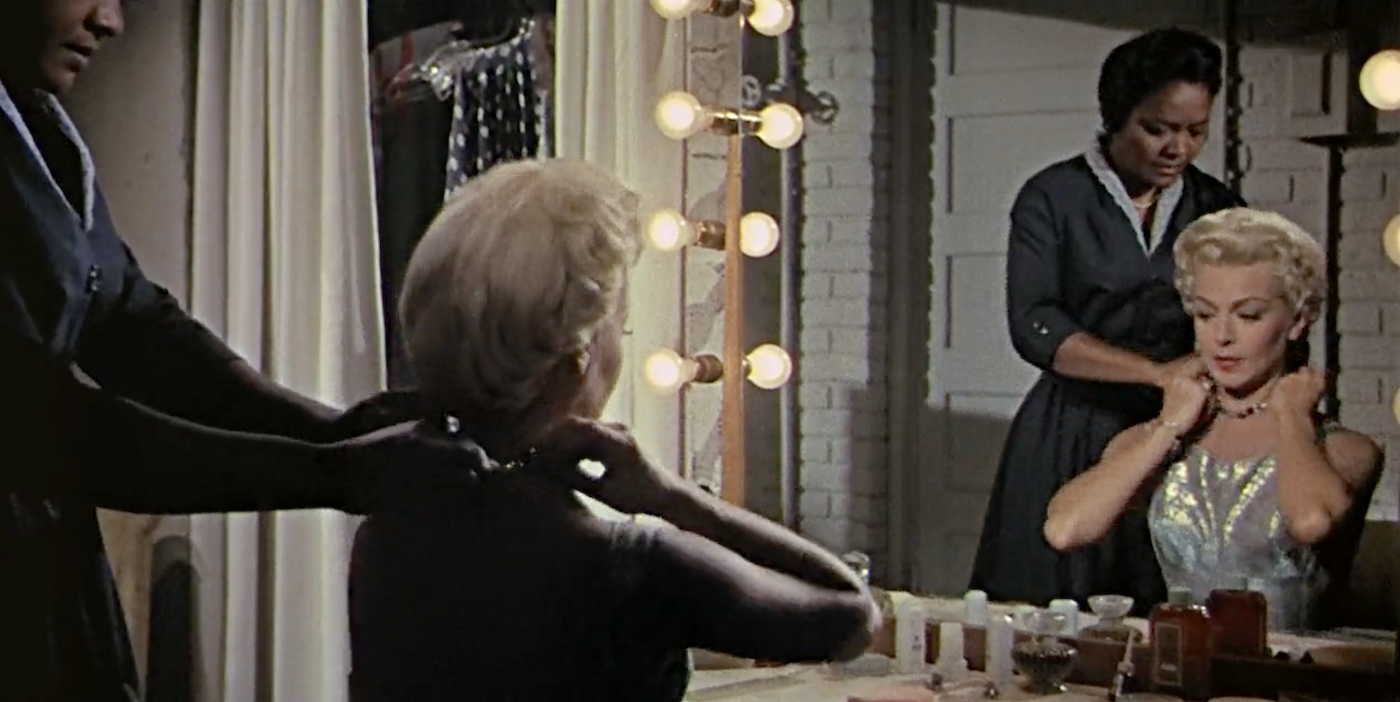
Ten years of unstoppable Broadway success later and Lora has moved up from her apartment in a cheap tenement house to a mansion she shares with Annie and their daughters. You couldn’t ask for a bigger home, yet for all the gilded mirrors, giant rooms, and glamorous furniture, the color scheme is virtually unchanged. The women’s outfits are very often the only deviations from the whites, blacks, grays, and earth-tones that still dominate their living space. Even her dressing room bears this color scheme. What, beyond their newfound economic status, has fundamentally changed for these characters after a decade? Lora is still unhappy, now feeling restless in her career choices and unsure about marrying her longtime lover/playwright David Edwards (Dan O'Herlihy). She still loves her daughter (now played by Sandra Dee), and still barely sees her now that she’s away at boarding school. The reasons are new, but Turner’s own rendering of Lora’s disappointment has much of the same textures as she did before the jump forward in time, when she was desperately trying to find work. The architecture is different, but the colors are still functionally the same.
Which leads into the other, more central critique of Lora within the film: she acts too much. It’s meant literally in some instances, as Lora never seems to stop working once she makes it big. Susie would especially like it if her mother worked less, so that they could spend more time together. We can’t apply this critique directly to her stage career because, even though Imitation of Life shows the skepticism and support her loved ones have towards her career choices, we never actually see any of her performances, only a rough day advertising and an audition for a play with dialogue so bad she wins the playwright’s respect for fixing it on the spot. But she’s also accused of chronic overacting in her own life, self-dramatizing her sorrows and aches to pull sympathy from people who already love her. It’s a cruel argument, and one that feels more fascinating for not being entirely persuasive. Turner’s own performance doesn’t feel like she’s leaning into this aspect of the character, or modulating herself to indicate when Lora is or isn’t being sincere. Scene by scene, she exemplifies a certain kind of melodrama acting style, somehow connecting to her screen partners even as her penchant for looking off into the distance during a weighty conversation occasionally looka like she’s spiking the camera and staring at us. If she’s acting, she’s never “off”, and she’s not alone either. Compared to Kohner’s self-aggrandizing tendencies, Dee’s shallowness, or Moore’s kabuki smile, Turner provides a level of emotional and psychological transparency that’s utterly distinct within her film. Her feelings are written all over her face, and even when those feelings are compromised or limited they’re honest and in-the-moment in a way no one else onscreen matches.
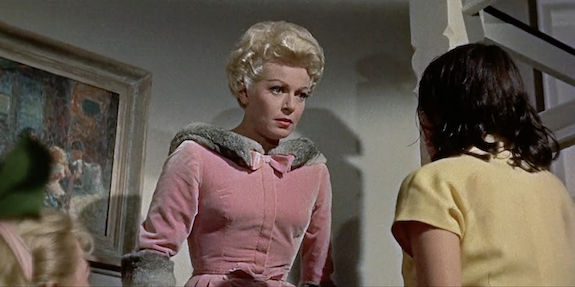
Of all the performances in Imitation of Life, only Turner’s is undergirded by explicitly metatextual baggage. We’re always aware we’re watching Lana Turner, yet Sirk doesn’t illuminate this by distancing Lana from Lora but fusing them together. The sympathies and attacks Lora accrues, her dispositions and dreams, are inseparable from Turner and her star persona, or at least the version of her persona burnished by the film. Thus, when Lora scolds Sarah Jane for disrespecting Annie by pretending to be white, and we get the sense that Lora is either more concerned with Sarah Jane’s treatment of her mother than her violent denial of her own blackness or not totally grasping the importance of that denial, it’s not clear if Turner herself is purposefully achieving this wavelength. Is she missing Sirk’s marks, or following them while he emphasizes her dissonance within this scene? This kind of tension isn’t exclusive to her, but the moments where other characters embody it - in Sarah Jane/Susan Kohner’s sultry, awful singing and dancing, in Susie/Sandra Dee’s grating inauthenticity - read as further indictments of her negative influence on the people she’s raised.
But even with all this, Imitation of Life is able to display real sympathy for Lora/Lana, and to put the audience firmly in her corner. Some of these aspects feel more foundational to the writing but still crucial to Turner’s own performance, like giving Lora her success without compromising her principles. We never doubt she loves her daughter, or Annie, or Sarah Jane, even if her methods of expressing that love or consideration of that person are worth poking at. Turner’s commitment to her character’s ambition is a tremendous boon to the whole project, especially for the first hour, where her career is far more central to Imitation, and it’s so rewarding when the film has her back throughout her career choices, as when Lora’s foray into dramatic acting is so well-received it practically knocks David out of the picture. It helps that her most memorable critics - Steve, David, fucking Susie - are too obviously colored by their own desires of who they want Lora to be for their impressions to carry much weight, and massively less charismatic to boot. Compare Lora’s foibles to her daughter’s and it’s clear how much the film asks us to invest in her, and it’s hard not to imagine taking her side when Susie cruelly indicts her mother for her own messy romantic impulses. Sirk’s protagonists never feel so unfairly maligned than when their awful kids criticize them for being everything a child could want except for that one thing this particular ungrateful brat always wanted.
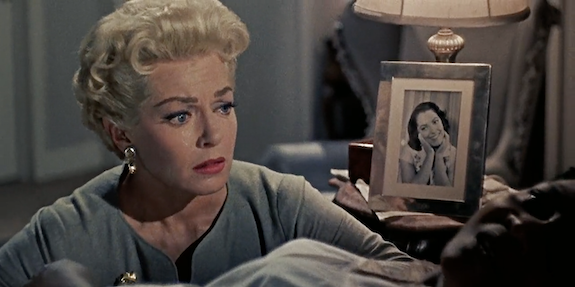
All of these elements collide in Turner’s last big scene, very nearly the final sequence of Imitation of Life, as Lora stands by Annie’s bedside and stays with her until she dies. It’s peak melodrama, from the Unspecified Illness/Broken Heart that’s killing Annie in the first place to the sheer length of it, clocking in at just over four minutes. Turner has to be on the edge of a tear-stricken breakdown the entire time, and it’s among the most unusual spectacles in the film. Her emotions read as sincerely as they have previously, yet the sustained effort of it makes it so conspicuous, more legible as an affectation constructed by a performer and exposed by her director than grief roiling through a woman who’s watching someone she loves die. Lora’s declarations of care and grief are rendered tired soap opera dialogue, and it’s almost perverse to watch her start to say something else only for Annie to cut her off with one more last request, one more final goodbye, one more poetic gesture. Annie often does this in either the center of her own shot or from in the very corner of a shared frame that Lora largely dominates, alongside a silver photo of Sarah Jane and the growing awkwardness that Turner is quite literally taking all the oxygen out of the room from this dying woman.
The elements of glamour, desperation, and familial dismay that define Lora Meredith are hardly exclusive in Turner’s filmography. The murderous wife in The Postman Rings Twice (1946), poor in most senses of the word and clawing at the smallest possible grasp for a better life; The actress in The Bad and the Beautiful (1952), debased in ways that would send Lora to tears; The single mother with secrets of her own in Peyton Place (1957) scared of her daughter’s curiosities and how her own failures haunt them both, and earning Turner her only Oscar nomination. Lora Meredith feels like an inevitable synthesis of all of these women, reveling in just about every aspect of Turner’s screen persona and tabloid life in ways that dredge up what’s vividly accessible about her yet dubious almost in spite of itself. Sometimes she looks a bit in over her head, but still you root for her, especially when it enables some glorious aspect of the film or winds up revealing how uniquely resourceful she can be. Her casting in Imitation of Life is about as backhanded an opportunity as a person can get, and I wouldn’t say everything that makes her so fascinating is because of what she’s doing. But she is fascinating, indelibly so, in a film that benefits immensely from her contributions and would feel molecularly different without her. There was no one like Lana Turner, and no other film or performance has made that abundantly, prismatically clear quite like this one.
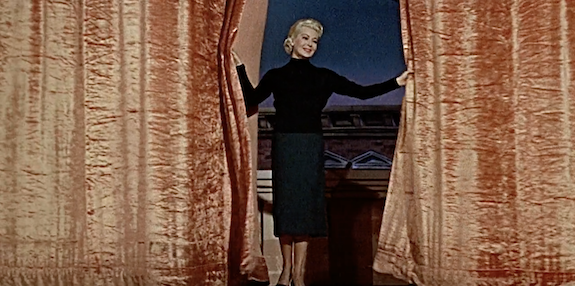



Reader Comments (12)
Too bad Lana was passed over for the lead in Where Love Has Gone
A Douglas Sirk-Ross Hunter masterpiece from those dazzling opening credits to the final fade out
Cried my eyes out both times I saw it.
This was an incredible film and Lana Turner brought it. I would've expected for someone who becomes successful to leave someone like Annie behind but no... she was loyal and I liked that. Douglas Sirk was a true artist and this is melodrama done right.
I love this analysis. It perfectly captures the appeal of Lana Turner even within the limitations of her craft. I always felt this was her best performance because of the way she completely commits to it.
Imitation of Life was one of the few classic films I was exposed to as a child. I have fond memories of watching with my mother, both of us utterly destroyed and sobbing. I thought Lana Turner was the most beautiful and most glamorous person to ever live. I adore her in this film. She is the very personification of melodrama to me. (Also, OMG, how hot is John Gavin in this film?!? Daaaaamn.)
I haven’t seen this but found Lana Turner totally captivating in The Postman Always Rings Twice. I will have to ad this to my list! Thanks for the entertaining article, Nick.
Lana Turner is the definition of a movie star for me. A superstar.
A whole week of Lana! Yea!!!!!!
Wonderful insights into this performance. She's given a few performances that were more textured than this one-Postman and The Bad & the Beautiful come to mind-but this is my favorite of all her films and onscreen work.
The suggestion of Dorothy Malone in her part is an interesting one and I'm sure she would have given a thoughtful, in depth performance but I don't think she would have made the same impact. The film needed Lana and her special distinctive brand of uber glamour to truly realize the story it's selling.
Juanita Moore and she share a wonderful connection even though they could not be more different. Perhaps it's that profound difference that makes their interplay so involving and I'm not sure it would have been there with another actress.
To your point of Lora being more fearsome in her defense of Sarah Jane disrespecting Annie than her passing for white I've never felt that was out of place. She understands Sarah Jane's desire to be white and the problem it presents in the abstract, evidenced by her dressing down of Sarah Jane after she makes a fool of herself in front of Lora's agent and director. But as a mother herself she can actually connect to Sarah Jane's shabby treatment of Annie and react to it emotionally. And she tears up the deathbed scene!
Love Lana and have managed over the years to see all her films-some very good, a few VERY bad and many lightweight pleasant baubles-but no matter the material she had than indefinable something that is what star power is all about. Very excited to see which of her films will be essayed.
Lana looks so much like Beyonce
I came to know Lana Turner from her being Jane Wyman's nemesis on Falcon Crest. Even then, many years past Imitation of Life, you understood immediately she was legendary.
Side fun fact: Susan Kohner is the mother of actor/director/producers Chris and Paul Weitz (which you probably knew already :D but still kind of fun).
While Lana's finest hour on the screen, she has the misfortune of still being upstaged by the magnificent Juanita Moore. Still, I'd have surely nominated her.